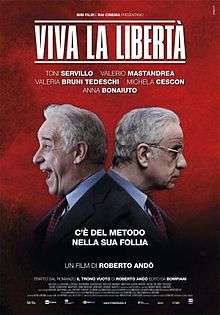Long Live Freedom
| Long Live Freedom | |
|---|---|
 | |
| Directed by | Roberto Andò |
| Produced by |
Angelo Barbagallo Gaetano Daniele |
| Written by |
Roberto Andò Angelo Pasquini |
| Starring |
Toni Servillo Valerio Mastandrea Valeria Bruni Tedeschi |
| Music by | Marco Betta |
| Cinematography | Maurizio Calvesi |
Release dates |
|
Running time | 94 minutes |
| Country | Italy |
| Language | Italian |
| Box office | $48,541 (US)[1] |
Long Live Freedom (Italian: Viva la libertà) is a 2013 Italian comedy-drama film directed by Roberto Andò.[2] It won the Nastro d'Argento for Best Screenplay and the David di Donatello for Best Script and the David di Donatello for Best Supporting Actor to Valerio Mastandrea.[3][4]
Plot
Enrico Oliveri is a shrewd, experienced politician, a senator and party leader of the center-left whose career is in decline. His party is currently in opposition and by all projections is headed for another defeat in the upcoming elections. Members of his party want to dump him. Suffering depression and exhaustion, he decides to disappear for a while, hiding incognito in Paris, France at the home of a former lover, Danielle, who is now married to a famous film director by whom she has a school-age daughter.
Panic ensues among Oliveri's political intimates when they discover his disappearance. His right-hand man, Andrea Bottini, does not lose faith, but instead gets the idea of secretly substituting Oliveri's twin brother, Giovanni Ernani, an over-the-top writer and philosopher who has previously spent time in mental health care and is still medicated. Complications ensue, but the substitute proves more outgoing, more visionary, and much more popular with the press, the public and even with his competitors than his more serious brother, and he leads the party towards victory. The real senator rediscovers himself while watching his brother's success from afar through the French newspapers as he himself dallies in the arms of lovers. Enrico Oliveri eventually returns to Rome. But does he resume his life, or is his mad brother left in charge? The film ends in ambiguity.
Context
The backdrop of the film is the depiction of a despair bordering on self-loathing of much of the Italian electorate at Italian economic conditions and the austerity regimen imposed by the European Union. A "Chancellor" obviously intended to be Angela Merkel appears in the film without being named. While some have found the film somewhat lightweight,[5] an extended quotation from Berthold Brecht placed in the mouth of the mad brother reveals the director's intent: when politicians and political institutions fail, only the spirit and individual efforts of the people can rescue a nation from crisis.
Cast
- Toni Servillo: Enrico Oliveri/Giovanni Ernani
- Valerio Mastandrea: Andrea Bottini
- Valeria Bruni Tedeschi: Danielle
- Michela Cescon: Anna
- Anna Bonaiuto: Evelina Pileggi
- Eric Nguyen: Mung
- Judith Davis: Mara
- Andrea Renzi: De Bellis
- Massimo De Francovich: President of Republic
- Renato Scarpa: Arrighi
- Gianrico Tedeschi: Furlan
Production and Distribution
The movie was produced by BiBi Film and RAI Cinema. The post-production was carried out by Reset VFX S.r.l.. The distribution of the movie is by 01 Distribution.[6]
References
- ↑ "Viva La Liberta (2014) - Box Office Mojo". boxofficemojo.com.
- ↑ Jay Weissberg (February 28, 2013). "Review: 'Viva la liberta'". Variety. Retrieved 25 February 2014.
- ↑ Alessandra Vitali (6 July 2013). "Nastri d'argento, l'appello di Andò: "Ripristinare tax credit, pronti a boicottare Venezia"". La Repubblica. Retrieved 10 March 2014.
- ↑ Silvia Fumarola (15 June 2013). "Sei David per Giuseppe Tornatore trionfa ai David di Donatello 2013". La Repubblica. Retrieved 28 February 2014.
- ↑ Bob Mondello. "'Viva La Libertà' Offers Harmless Electoral Fun". NPR. National Public Radio.
- ↑ Reset VFX. "Viva La Libertà".